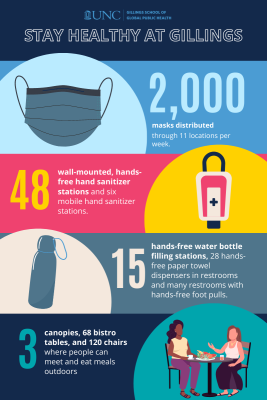Staying healthy at Gillings: Q&A with Brent Wishart
November 23, 2022

Brent Wishart
Brent Wishart, Julie McManus and David King are familiar faces that have been supporting day-to-day activities at the Gillings School in ways that most of us may not realize. From overseeing renovation and construction projects to implementing safety measures to protect the Gillings community from health and environmental hazards, their work spans all departments of the School.
The Gillings facilities management team has also been collaborating with UNC Environment, Health and Safety and environmental sciences and engineering experts like Rebecca Fry, PhD, and Howard Weinberg, PhD, to keep the Carolina community updated on lead in campus drinking water.
Recently we chatted with Wishart about some of the important ways his team has been ensuring safety at the Gillings School.
In light of reports about lead found in drinking water at Carolina, are the fountains and sinks at Gillings safe? How do you ensure this?
We were ahead of the curve on this issue due to our multi-pronged efforts implemented to reduce touch points on shared surfaces. Good examples are the hands-free water bottle stations on nearly every floor of our complex, as well as the hands-free paper towel dispensers and door pulls in restrooms.
We have nearly replaced all of the older fountains with the new bottle stations, which are certified to be lead-free in the materials, as well as the filters in these models, which are also certified to remove any lead from the water.
During the COVID-19 shutdown, when very few people were on campus, we flushed the building plumbing weekly, tested chlorine levels in the water and turned off all but five water fountains to lessen the risk of Legionnaire’s disease, which can be an issue in large buildings that are not occupied.
We take the safety and security of the Gillings community seriously and are committed to creating and maintaining the safest possible environment to work and learn.
Can you give a general overview of your process for ensuring the school can nimbly respond to health and safety hazards?
We have a busy complex on campus, with more than 1,000 people often in our spaces at a time. We have to be on constant guard for spills and other hazards in a wide variety of spaces.
Rainy days tend to be very busy when we are all on the constant lookout for wet spots. You may wonder why so many “wet floor” signs are in the hallways on rainy days. People are often in a hurry coming to work or class and may forget to take it a little more slowly on wet days. We keep umbrella bags at our busy entrances to minimize water on the floor and have installed flooring materials at most entrances and other high-traffic locations that trap dirt and water.
We are lucky to have a talented team that works together to monitor the conditions within the School.
David King and Julie McManus are also on alert for safety issues. Julie keeps the 11 face-mask stations stocked each day, and David is often found outside blowing leaves from our courtyards and sidewalks. Wet leaves are a hazard outside and can be a slip hazard if they get tracked into the building. Julie and David are in constant contact with UNC Facilities Services and Housekeeping to ensure our spaces are maintained and safe.
Cassandra Davis, our security guard on duty during the day, is often on patrol, and one of her many roles is to let our facilities team know when there’s an issue that needs to be addressed. Gloria Thompson, our daytime housekeeping porter, makes her rounds every day ensuring spaces are clean and sanitized.
What are some creative solutions you’ve been able to put in place to ensure the Gillings community can work and learn safely?
The hands-free bottle stations have been a big investment in the safety of our community. They are a great way to reduce waste by encouraging bringing your reusable water bottle to campus, and they are also a great way to reduce risk of germ transmission from a high-touch surface. We have installed foot pulls on many restroom doors.
As I mentioned before, we also have 11 locations where face masks are available. There are nearly 50 touch-free hand sanitizer stations throughout our complex, as well as umbrella bags. Many of these safety measures are not found elsewhere on campus or in the quantities that we have made available. We also have installed automated external defibrillator (AED) units in each lobby in Rosenau, McGavran-Greenberg and the Michael Hooker Research Center Armfield Atrium.
What kinds of educational training or resources are available so people can be better prepared to respond to health and safety concerns?
We are just now getting back on a regular schedule of CPR training and emergency training sessions, which cover issues such as active shooter response. Please plan to join our next emergency training and active shooter session on Wednesday, Jan. 18, 2023, from 2-3 p.m. Registration is at this link.
Gillings has an All-Hazards Committee that meets quarterly to discuss safety issues within the complex and to discuss training opportunities. In the last few weeks, we participated in a training with the Chapel Hill Fire Department that covered how they respond to laboratory incidents on campus. You can learn more about these topics on our emergency information page.
Our facilities office also utilizes email to notify the Gillings community about hazardous situations. This most frequently involves where to shelter during severe weather. This information is also found on our emergency information website.
Contact the UNC Gillings School of Global Public Health communications team at sphcocmm@unc.edu.

